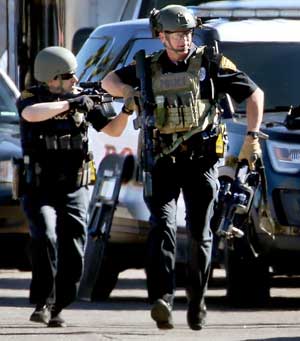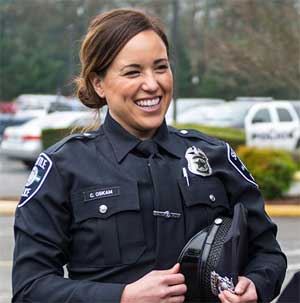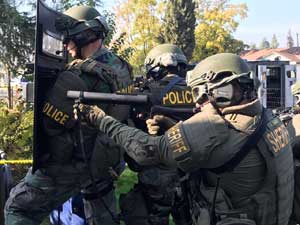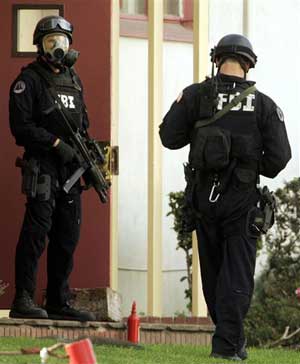 When beginning or even considering a career in law enforcement, there are a lot of different types of law enforcement agencies and options out there to look at. With local agencies there are police departments and sheriff’s departments. Because these are the types of agencies that most citizens interact with, these are the most common agencies for people to consider working for when going into law enforcement as a career. However, there are port police, airport police, park police. The district attorney’s office and the public defender’s office have investigators. Often, the coroner’s office and the medical examiner’s office have investigators.
When beginning or even considering a career in law enforcement, there are a lot of different types of law enforcement agencies and options out there to look at. With local agencies there are police departments and sheriff’s departments. Because these are the types of agencies that most citizens interact with, these are the most common agencies for people to consider working for when going into law enforcement as a career. However, there are port police, airport police, park police. The district attorney’s office and the public defender’s office have investigators. Often, the coroner’s office and the medical examiner’s office have investigators.
The types of law enforcement jobs that you’ll find with local agencies include police officers and deputy sheriffs, and they are very similar. One of the differences between a deputy sheriff and a police officer is that often the sheriff’s office operates the jail. So, it’s fairly common where new deputy sheriffs will spend their first few years working in the jail. However, some sheriff’s departments now have an entry level position to work patrol, and a separate entry level path to work in the jail. That way there is a separate career path for new hires in the sheriff ranks who are not interested in working in the jail.
Many law enforcement agencies have their own dispatchers, and there are support staff positions. Larger departments often have their own:
- Crime analyst
- Evidence technicians
- Crime scene investigators
- Crime scene technicians
- Crime lab personnel
Where are most of the jobs?
With many agencies, the majority of the hiring will happen with the positions of police officer and deputy sheriff. In local departments, these positions make up the majority of positions within an agency.
There may have an agency with 400 sworn officers, yet only a few criminal analysts. The criminal analysts may stay for a long time in these positions, so there’s very little turnover. In many local departments, jobs such as crime scene investigator and photographer, are done by the sworn officers who are assigned to that specialty. Recruiting can occur on a regular basis, especially with larger agencies, so that the pipeline of new potential recruits is always full. With smaller agencies, recruiting may only occur when there are vacancies to fill.
For many jobs in law enforcement, there is an important distinction between sworn and non-sworn. Sworn positions carry a firearm, carry a badge, and have powers of arrest. These are the positions that you would most likely think of such as a police officer, and deputy sheriff.

The requirements for most sworn jobs will be similar. It’s satisfying the POST or Peace Officer Standards and Training requirements for the particular state that the agency is located in. These requirements will include education, age, and citizenship. There may be a minimum age and possibly a maximum age. Usually it is required that applicants have a drivers’ license from that state. It will also include a police background check, police polygraph questions, a law enforcement entrance exam, and police oral board questions.
For specialty jobs that are not sworn, there generally is not a maximum age. There may be educational requirements that are geared towards the area of expertise related to that particular job.
Types of State Agencies
With state law enforcement agencies, there can be a variety of different types of departments varying by state. Often, there are state police, department of public safety, and state patrol whose duties include patrolling the major roadways. Many states have a criminal investigation division that work major crimes such as homicide, narcotics, and internet crimes against children.
Many states have a department of natural resources, which often has a law enforcement component. These can be game wardens or conservation wardens. Most states will have investigators or special agents in their department of revenue. Sometimes they’re criminal investigators or sworn, sometimes they are general investigators or not sworn. Many states have gaming, narcotics, or lottery investigators or special agents. Many states have a capital police force, and most states have a law enforcement component within their department of corrections.
One example of a state law enforcement agency is the Texas Department of Public Safety. They have a variety of different divisions, and they’re very large agency. They have 573 sworn officers in their criminal investigation division, 150 rangers, and they have over 2,000 sworn state troopers.
In the state of Wisconsin, as an example, there’s the Division of Criminal Investigation, the Wisconsin State Capital Police, the Wisconsin State Patrol.
There are agencies that have a law enforcement component such as:
- Wisconsin Department of Natural Resources
- Wisconsin Department of Corrections
- Department of Revenue
Agencies within an investigative, although a noncriminal component:
- Wisconsin Department of Agriculture, Trade and Consumer Protection
- Wisconsin Department of Financial Institutions.
The types of sworn positions that you’ll find with state agencies are often more specialized. These include:
- Capitol police officers
- Conservation wardens
- Special agents
- State troopers
- Motor carrier inspectors
There are general investigators who investigate non-criminal activity. There are criminal analysts, probation and parole agents, crime lab personnel, program managers, and program and policy analysts. So, you can see that at a state level, there really is a vast variety and specialization.
Requirements
The police officer requirements to get into law enforcement will generally include education requirements, it could be a high school diploma or GED, 60 college credits, or a four-year degree. The minimum education requirements will vary by state. Each state has their own Peace Officer Standards and Training or POST requirements, and the reason why it is called peace officer is because includes not just police officer, but deputy sheriff, conservation warden, criminal investigator, state trooper and other SWORN – LAW ENFORCEMENT JOBS in the state which are with either a local or state agency..

The police requirements to be a state police officer, state trooper, motor carrier inspector, and conservation warden, are similar to the requirements to be a local police officer. For special agents with state agencies, it may be an entry level position, or it may requirement experience. For all state law enforcement positions, individuals must meet the POST or Peace Officer Standards and Training requirements. Every state’s POST requirements will vary.
General investigators positions are not certified law enforcement officers and the required qualifications will vary greatly. Generally, a two or four-year degree is required. For criminal analysts, generally, a four-year degree is required. Probation and parole officers usually have a four-year degree. If you’re going in to a specialty, such toxicology with a crime lab, you generally will need a science or chemistry-related college degree. More specialized positions may require a graduate degree. Or, the competition for those specialized degrees has raised the bar to needing a graduate degree.
The required degrees can vary greatly, including the types of majors. For crime lab personnel, they must be trained and have the appropriate certifications for the areas in which they work such as
– Toxicology
– Biology
– Chemistry
– Blood spatter analysis
For program managers and program and policy analysts, generally a four-year degree is required.
Because law enforcement positions are with government agencies, they often require US citizenship. Some agencies require that the applicants have permanent resident status in the US.
Age Requirements

In the federal government, there is a maximum age requirement for law enforcement positions of 37. The reason being is that you must retire by the time you are 57 years old. There can be certain waivers for military veterans which can raise the maximum age requirement.
Where are most state jobs located?
If it’s a job that involves patrol, such as being a state trooper, it could be anywhere in the state. For other state positions, they are normally located either in the city that is the state capitol, or in the major cities in that state.
Federal Law Enforcement Jobs
When you look at jobs in law enforcement in the federal government, there really is quite a variety. There are agencies whose primary function is law enforcement, such as the FBI, Bureau of Alcohol, Tobacco, Firearms. There is the Secret Service, Drug Enforcement Administration, US Marshals Service, and US Capital Police.
There are agencies with a law enforcement component. Meaning, that the primary function of the agency is not law enforcement, but they do have divisions within the agency that have a law enforcement mission, such as in the US State department, Bureau of Diplomatic Security. In the Department of Defense, there is the Defense Criminal Investigative Service. The US Postal Service has the Postal Inspection Service, and in the Internal Revenue Service is the Criminal Investigation.
Many federal agencies have their own independent police departments. These agencies include:
- US Supreme Court
- Library of Congress, CIA
- Smithsonian
- US Mint
- Bureau of Engraving
There’s also the Office of Inspector General. All cabinet level positions have an inspector general, and they do have an investigative function that includes Criminal Investigators or Special Agencies. There are over 100 federal law enforcement agencies or agencies which have a law enforcement component.
There are many federal agencies that have a noncriminal investigative component. There are also intelligence agencies and agencies that have an intelligence function. These would include:
– Central Intelligence Agency
– National Security Agency
– Defense Intelligence Agency
– National Geospatial Agency
At the federal level, some of the categories of law enforcement would include criminal investigator, such as special agent, general investigator, and this would be a noncriminal investigative position.
There are miscellaneous investigative positions such as aviation safety inspector and transportation security administration inspector. There are special classifications for border patrol agents, customs inspector, and immigration inspectors.
The requirements for most federal law enforcement positions will be a four-year degree. Some police jobs will not require a four-year degree, and some miscellaneous investigative positions will not require a four-year degree.
As far as where federal law enforcement positions are located, many are in Washington, D.C. There’s also positions in regional offices. Regional offices would include major cities such as Chicago, Atlanta, Los Angeles, Houston, Dallas, and Denver. There are federal positions along the border, and there’s also federal law enforcement positions in major cities throughout the US.
Local, state or federal law enforcement, which is better?

The advantages in working for a state law enforcement agency is they have more specialized work. Also, many state agencies have entry level investigative positions. Federal agencies also have specialized work, and with most federal law enforcement agencies they have entry level investigative positions, no experience required. There is also the ability to transfer between agencies. It is not unusual for somebody to work for two or even three law enforcement agencies in the federal government throughout their career.
There’s also a vast difference between pay for federal agencies. The average law enforcement pay for a detective rank is $66,000 per year. The average pay for a criminal investigator in the federal system is $85,000 per year. So, you can see that there is a difference between federal and local law enforcement pay.
With smaller local agencies there may be limited opportunities for advancement into specialized positions. With state employment, there may be some traveling involved. With the federal system, you’ll generally have to relocate in order to advance your career, and you may get transferred involuntarily. With many federal law enforcement agencies, new hires sign a mobility agreement which means that you agree to relocate to any location that serves the needs of the agency.
In the federal system, every job has a job classification code. Most law enforcement jobs are located in the 1800 series. The 1811 is the criminal investigative series. Any criminal investigative series jobs, including special agent, criminal investigator, are 1811s, whether it’s a job with DEA, FBI, Secret Service, whether they’re a criminal investigator or a special agent, they are 1811 series jobs.
There are general investigative series, and those are the 1810 series code. The main difference between an 1810 and an 1811 is 1810 investigators do not investigate criminal activity, and they are not sworn. There’s 1801, which covers a variety, inspection, investigation, enforcement, and compliance. Some of these positions are sworn, some are not sworn.
Here is a listing of all of the law enforcement jobs within the 1800 series. You can see included in the list are customs patrol officer and border patrol agent. There are a variety of 1800 series jobs.
1800 Series Jobs
- 1811 – Criminal Investigation
- 1896 – Border Patrol Agent
- 1895 – Customs and Border Protection Officer
- 1801 – General Inspection, Investigation, Enforcement, and Compliance
- 1805 – Investigative Analysis
- 1810 – General Investigation
Non 1800 series Law Enforcement and Intelligence Jobs
- 0083 Police Officer
- 0082 United States Marshal
- 0132 Intelligence Series
Whether you would like to work as a police officer, special agent, criminal analyst or some other type of support role, there was many different job available. All of these jobs exist with local, state and federal law enforcement agencies. Choosing the job and the agency that is right for you first involves finding out all of the different possibilities, and then determining which one meet you personal and career goals.

 Joseph Libowsky,
Joseph Libowsky,


